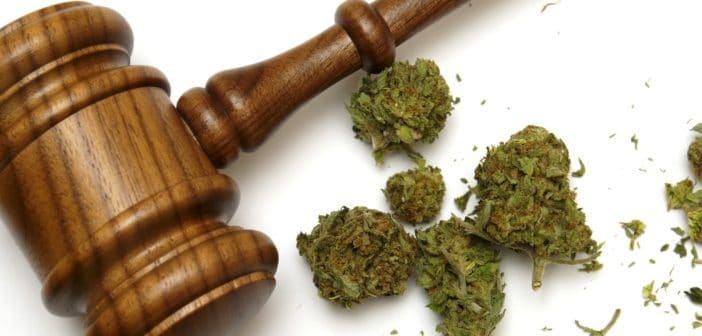 Many Americans immediately feared the End of Days when Donald Trump was elected to the Oval Office, but proponents of marijuana legalization may have legitimate fears about whether their days are numbered. For the multi-billion dollar marijuana business, several signs indicate that decades of progress might be coming undone. While on the campaign trail, President-elect Trump didn’t announce any strategies to combat drug addiction or change the face of recovery. In fact, for a man who staked a campaign on being louder than everyone else about every topic imaginable, he’s remained relatively quiet when it comes to America’s drug policy. But as one recent NBC News story observed, “like many issues, Trump has been all over the map on the marijuana question.”
Many Americans immediately feared the End of Days when Donald Trump was elected to the Oval Office, but proponents of marijuana legalization may have legitimate fears about whether their days are numbered. For the multi-billion dollar marijuana business, several signs indicate that decades of progress might be coming undone. While on the campaign trail, President-elect Trump didn’t announce any strategies to combat drug addiction or change the face of recovery. In fact, for a man who staked a campaign on being louder than everyone else about every topic imaginable, he’s remained relatively quiet when it comes to America’s drug policy. But as one recent NBC News story observed, “like many issues, Trump has been all over the map on the marijuana question.”
Over the years, Trump’s opinion has shifted dramatically. In 1990, he said that all drugs (including weed) should be legalized, with the profits used to fund education programs. In recent months, that stance has shifted to dealing with marijuana on a state-by-state basis. If Trump’s recent office appointments are any indication, though, his position on a hazy topic is becoming clearer by the day.
The Company He Keeps
As the NBC News story noted, “nine different states voted on marijuana-related ballot initiatives—four considered legal medical marijuana and five chose whether to legalize recreational marijuana.” Trump’s election might spell a major buzzkill for the eight that passed. (Arizona’s initiative is the only one that failed.) All along, Trump has argued that the federal government has no business being in the marijuana business. It also happens to be one of the rare instances where his and Hillary Clinton’s positions lined up. As recently as October 2015, Trump told supporters that “I think [marijuana legalization]should be a state issue, state-by-state.”
That sentiment might be coming to an end.
“I’m mostly concerned by the people around Donald Trump,” Ethan Nadelmann, Executive Director of the Drug Policy Alliance, told NBC News. Nadelmann, largely known as “the major powerhouse behind marijuana legalization in the country,” believes that by giving Rudy Giuliani, Chris Christie and Mike Pence seats around the table of a Trump Administration, there’s a dark future ahead for marijuana. Even worse, many feel, is the arrival of Alabama Senator Jeff Sessions as Trump’s candidate for attorney general. “Sessions is no fan of marijuana or its legalization, based on his previous comments, and as attorney general he would oversee federal prosecutors and the Drug Enforcement Administration (DEA),” NPR reported. Sessions sings the praises of Nancy Reagan’s 1980s “Just Say No” campaign—a campaign that’s as criticized as it’s been parodied. (Nadelmann even went so far as to call Sessions a “drug war dinosaur.”) And there’s no two ways about Sessions’ perspective on pot’s place in society: “We need grown-ups in Washington to say marijuana is not the kind of thing that ought to be legalized, it ought not to be minimized, that it is in fact a very real danger.” No matter which way you look at it, if Trump is stacking the deck, the cards aren’t in favor of marijuana.
“Good People Don’t Smoke Marijuana”
Trump told Bill O’Reilly in February that he’s “in favor of medical marijuana 100 percent,” but he’s not as quick to follow suit with recreational pot. That’s still true in the wake of California’s passing of Proposition 64, which many took to be a major win for recreational pot: “A majority of people in America’s most populous state believe that adults should be able to consume marijuana if they feel like it, like a glass of wine at 5 o’clock,” Time said. “By a margin of about 56% to 44%, voters passed Proposition 64, making California the fifth state to legalize recreational pot, after Colorado, Washington, Oregon and Alaska.” NPR even cited a Gallup Poll that “predicted a win in California could lead other states to follow suit.” Still, all signs point to a Trump Administration doing more than just frowning on states for growing, selling and enjoying their own weed. (“Good people don’t smoke marijuana,” Sessions told The Washington Post.)
The Time story notes that groups like the American Civil Liberties Union “have pushed for legalization as a matter of criminal-justice reform, in large part because minorities are disproportionately detained and jailed for cannabis-related offenses.” In other words, lawmakers may be taking a fresh look at old drug offenses: “Some past offenders will have a chance to get their records expunged (or get out of jail early); and people under the age of 18 will be “sentenced” not with jail time but drug counseling and community service if they are caught with cannabis. When they come of age, those records will be destroyed.” Amanda Reiman, the Drug Policy Alliance’s manager of marijuana law and policy, told Time that the Trump Administration is a major setback to all the progress they’ve made in recent decades. “We encourage people to think about cannabis in a new way as something that is perfectly acceptable for adults to do in a responsible way,” she said. “That’s one of the messages that legalization sends.”
Trumping the Future
One thing Trump can’t ignore are all the dollar signs around the weed business. “Sales of legal marijuana currently sit at $3.5 to $4.3 billion, but it could reach as high as $8 billion with the addition of the states that approved ballot initiatives [on Nov. 8],” the NBC News story said. It’s a figure that’s as eye-opening as it is mind-boggling, and there are no signs that it’s slowing down. The only thing that stands in its way, according to people like the California Drug Policy Alliance’s Amanda Reiman, is a Trump Administration that wants to change federal law. Two federal mandates—the Hinchey-Rohrabacher medical marijuana amendment and the Department of Justice’s Cole Memo—could be completely rewritten or tossed out altogether by a Trump Administration hell-bent against recreational weed.
“The Hinchey-Rohrabacher amendment is a piece of congressional legislation that prohibits the Department of Justice from spending federal dollars to enforce federal prohibition in states that have moved to decriminalize or legalize medical marijuana,” NBC News explained, while the Cole Memo “states that the federal government will not interfere with states that legalize recreational and medical marijuana.” Together, these two mandates keep marijuana decisions at a state level. “Every state…has used those guidelines as the North Star [on drug policy],” Lynne Lyman, the state director of California’s Drug Policy Alliance said. “So we have no idea whether a Trump administration will send in the DEA or FBI to shut down California’s marijuana industry.” While it wouldn’t be simple or straightforward, it’s also not inconceivable or impossible. After all, Trump himself beat similar odds to gain the White House.
Sponsored DISCLAIMER: This is a paid advertisement for California Behavioral Health, LLC, a CA licensed substance abuse treatment provider and not a service provided by The Fix. Calls to this number are answered by CBH, free and without obligation to the consumer. No one who answers the call receives a fee based upon the consumer’s choice to enter treatment. For additional info on other treatment providers and options visit www.samhsa.gov.




